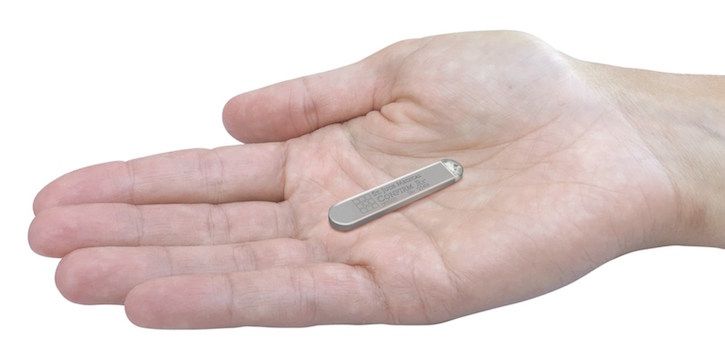FDA Approves First Smartphone-Ready Insertable Cardiac Monitor
Abbott's technology enables physicians to remotely identify arrhythmias in patients.

Credit: Abbott
When patients are outfitted with Abbott’s freshly approved Confirm Rx Insertable Cardiac Monitor (ICM), the device will be embedded just under the skin of their chest. The minimally invasive implant isn’t new. But its ability to connect with a user’s smartphone is.
The US FDA approved this week what Abbott called “the world’s first and only smartphone compatible ICM designed to help physicians remotely identify cardiac arrhythmias.” The device—and its connection to the mobile app myMerlin—will enable both patients and their healthcare providers to track the abnormal heart rhythms that develop due to disease or injury, according to the company.
Avi Fischer, MD, divisional vice president and medical director of Abbott’s Cardiac Rhythm Management business, said in a statement that the ICM exemplifies how medical devices and digital communications technology can merge to improve patient care.
“By offering a device that uses Bluetooth wireless technology from the patient’s smart phone,” Fischer said, “we can help physicians easily and remotely diagnose potentially dangerous abnormal heart beats without requiring the patient to use a separate or cumbersome recording device.”
After being implanted, Confirm Rx continuously monitors heart rhythms, searching for irregular heartbeats and atrial fibrillation, according to the company.
The data is then sent to the myMerlin smartphone app through a secure pathway, on a schedule determined by the clinic, Abbott noted. From there, physicians may access the information.
Patients, meanwhile, can “record symptomatic events” via the app, negating the need for handheld activators or bedside transmitters, according to the announcement. Patients may sync their data with their provider and check their transmission history. But they don’t need to contact the clinic to confirm that the data made it to the physician, Abbott added.
Confirm Rx and myMerlin encrypt communications with “the highest standards in mobile security,” according to the announcement.
In recent years, the FDA has made fostering innovation, especially in the digital realm, a top priority. That initiative has gained speed over the past couple months.
Just yesterday, for example, the FDA issued 3 guidance documents regarding the manufacturing of medical devices. Scott Gottlieb, the agency’s head, said he hoped the move would help “lower the barriers to innovation and improve patient care by reducing unnecessary submissions to the FDA for changes that could not significantly affect device safety or effectiveness.”
That followed the launch of a pre-certification pilot in September, which brought together 9 companies to find and solve problems and develop best practices for a program that stands to white-list certain organizations for fast-tracked software approvals. The FDA planned to scrutinize the operations of these groups—from Apple to Fitbit—this fall, determining how the regulator’s knowledge of each entity’s design and quality maintenance standards might play a role in reaching this goal.
Podcast: Adoption of Healthcare Tech in the Age of COVID-19 with Dr Kaveh Safavi
June 22nd 2021Kaveh Safavi, MD, JD, global health lead of Accenture Health, discusses how the pandemic influenced the speed at which healthcare organizations adopted new technologies and how this adoption is impacting patient care.